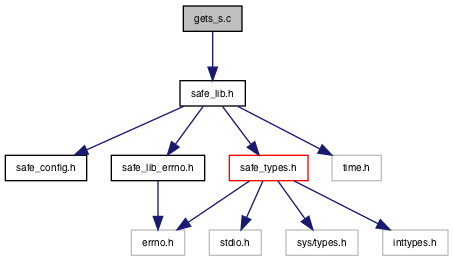#include "safe_lib.h" Include dependency graph for gets_s.c:
Include dependency graph for gets_s.c:Functions | |
| size_t | strnlen (const char *, size_t) |
| EXPORT char * | gets_s (char *restrict dest, rsize_t dmax) |
The gets_s function reads characters from stdin until a newline is found or end-of-file occurs. More... | |
Function Documentation
◆ strnlen()
| size_t strnlen | ( | const char * | , |
| size_t | |||
| ) |
◆ gets_s()
| EXPORT char* gets_s | ( | char *restrict | dest, |
| rsize_t | dmax | ||
| ) |
The gets_s function reads characters from stdin until a newline is found or end-of-file occurs.
Writes only at most dmax characters into the array pointed to by str, and always writes the terminating null character.
Note that C11 allows only writing dmax-1 character. We need to work with the system fgets() passing it dmax+1. In any case, gets_s first finishes reading and discarding the characters from stdin until new-line character, end-of-file condition, or read error before calling the constraint handler. With SAFECLIB_STR_NULL_SLACK the rest of dmax is cleared with NULL bytes, without all elements following the terminating null character (if any) written by gets_s in the array of dmax characters pointed to by dest take unspecified values when gets_s returns.
- Remarks
- SPECIFIED IN
- C11 standard (ISO/IEC 9899:2011): K.3.5.4.1 The gets_s function (p: 602-603) http://en.cppreference.com/w/c/io/gets
- ISO/IEC TR 24731, Programming languages, environments and system software interfaces, Extensions to the C Library, Part I: Bounds-checking interfaces
- Parameters
-
[out] dest character string to be written. If the resulting concatenated string is less than dmax, the remaining slack space is nulled. [in] dmax restricted maximum length of the resulting dest, including the null. it may temp. write dmax+1, but always return max dmax.
- Precondition
- dest shall not be a null pointer
- dmax shall not equal zero
- dmax shall not be greater than RSIZE_MAX_STR
- Note
- C11 uses RSIZE_MAX, not RSIZE_MAX_STR.
- Returns
- If there is a runtime-constraint violation, then if dest is not a null pointer and dmax is greater than zero and not greater than RSIZE_MAX_STR, then gets_s nulls dest.
- Return values
-
>0 when successful operation, all the characters from src were appended to dest and the result in dest is null terminated. 0 + errno=ESNULLP when dest is a NULL pointer 0 + errno=ESZEROL when dmax = 0 0 + errno=ESLEMAX when dmax > RSIZE_MAX_STR 0 + errno=ESUNTERM endline or eof not encountered after storing dmax-1 characters to dest.
- See also
- scanf_s()
